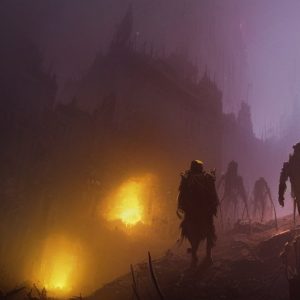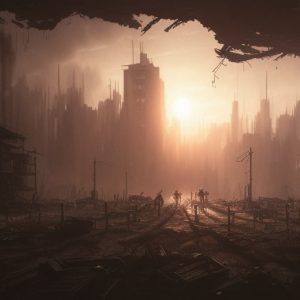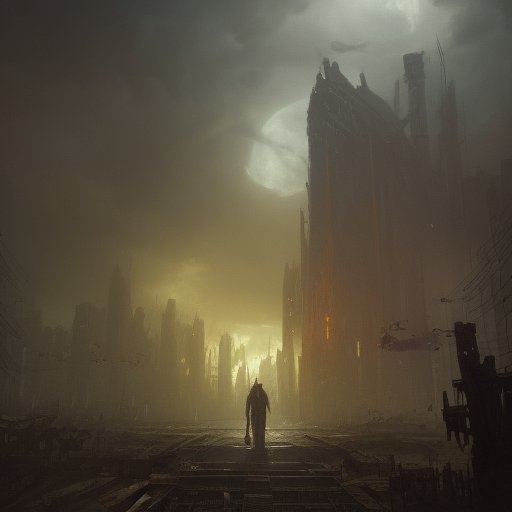
Are you ready for the apocalypse? In this DIY primer, we’ll show you how to survive the end of the world as we know it. Learn essential skills to outlast the collapse of society, from building a bunker to foraging for food. But survival isn’t just about meeting basic needs – it’s about community, resilience, and hope. We’ll teach you how to build a new world from the ruins of the old. Are you ready to join the ranks of the survivors?
I. Introduction
Welcome, fellow survivors, to the Apocalypse. The end of the world as we know it is upon us. The signs were clear – massive storms, earthquakes, and rampant disease. Governments fell, infrastructure collapsed, and civilization crumbled. But we, the few who remain, will not give up. We will fight for our survival with every fiber of our being. We will not be defeated by the destruction that surrounds us.

But how do we begin to prepare for the unknown? How do we ensure our survival in a world that seems determined to snuff us out? This is where the DIY Primer comes in. We will teach you the skills you need to persevere in the face of disaster. From building shelter to finding food, from repelling raiders to creating a new community, we’ve got you covered.
We know it can be overwhelming to face such uncertainty. After all, none of us could have predicted this, and we’ve all lost so much. But we believe that, even in the darkest moments, there is hope. There is still love, and empathy, and kindness. There is still a future, waiting for us to build.
So let us embark on this journey together. Let us share our knowledge and strengths, as we work to rebuild a world that is safer, healthier, and more equitable than the one that came before. The Apocalypse may have destroyed much of what we knew, but it cannot take away our spirit, our resilience, or our determination to survive.
II. Preparing for the Worst
Now that we’ve gotten our spirits up, let’s get to work. First up, we need to focus on the basics of survival. Water, food, and shelter are our big three. Let’s start with shelter. In the DIY Primer, we’ll teach you how to set up a shelter with just a few items you might have lying around. We’ll also guide you through setting up a perimeter to keep unwanted guests out.

Next up is water. Without access to clean, drinkable water, we won’t last long. Learn how to collect and filter water from various sources. We’ll also show you how to store it safely to ensure you have enough supply.
And finally, food. Rationing what’s left of our pre-apocalypse stores will only get us so far. We have to learn how to forage for food and prepare it safely. Our tips include sources of edible plants, traps to catch small game, and how to preserve food for the long haul.
But survival isn’t just about knowing the scientific know-hows. You need to be as mentally prepared as you are physically. Stay alert for signs of danger and have a plan for how to handle it. Take care of your mental health, too – establish routines, set small goals, and foster social connections with those around you.
Just remember the DIY Primer will be your guide to all basic survival. Keep a level head and know that with the right tools and mindset, you can make it through the apocalypse. Stay strong and focused on our goal – the hope of building a new, better world from the ruins of the old.
III. Beyond the Basics
So, you’ve mastered the basics of survival. You’re comfortable building shelter, finding food, and defending yourself against raiders. But what about those situations that require a bit more finesse? In this section, we’ll show you advanced techniques for staying alive and thriving in the Apocalypse.

One key element of survival is navigation. Without reliable maps or GPS, it can be easy to get lost in your own backyard. This is where pathfinding comes in. By mastering basic orienteering skills and creating your own maps, you can venture further into the unknown with confidence.
Another crucial skill is first-aid. Injuries and illnesses are all but guaranteed in the Apocalypse, and you need to be able to treat yourself and others. Learn how to identify and tend to common ailments, as well as how to improvise when medical supplies are scarce.
Perhaps most importantly, we’ll talk about mental health. The Apocalypse can be a traumatic experience, and you need to know how to take care of your mind as well as your body. Learn coping mechanisms for stress and anxiety, and how to build bonds of trust with other survivors.
Of course, advanced survival techniques are not just about staying alive. They’re also about resilience and adaptability. You might need to learn how to scavenge for materials, create your own fuel, or even start your own hydroponic farm. Whatever challenges you face, be ready to roll with the punches and find creative solutions. After all, the Apocalypse is not for the faint of heart.
As you continue to improve your survival skills, never forget that there is no shame in asking for help or learning from others. Together, we can push through the difficulties and create a new world. Because when everyone is a survivor, no one is alone.
IV. Building Your Post-Apocalyptic Community
After the Apocalypse, we must work together to build a new community. This is not a task for any one person, no matter how skilled or resourceful. It will take all of us working together, sharing our expertise and labor, to create a society that is resilient, just, and compassionate.

First, we must establish the basis of our community – our values, governance, and infrastructure. We need to determine what kind of world we want to build, and how we will make it happen. This requires open communication, active participation, and a willingness to compromise.
Next, we must focus on practical matters. We will need to divide tasks according to skills and abilities, establish trade and commerce networks, and provide food and housing for all residents. It may be necessary to set up security teams and develop a system of justice to protect our community from external threats and internal discord.
But building a community is not just about logistics – it’s about relationships. We must prioritize empathy, communication, and collaboration. We must learn to treat each other with respect and kindness, even in difficult circumstances. We must find ways to celebrate our strengths and perspectives, and to support each other through challenges.
Of course, building a community is not without its challenges. We will likely face setbacks, conflicts, and even failures. But we must remember that mistakes are not the end of the world – they are opportunities for growth and learning. We must remain adaptable, flexible, and creative in the face of adversity.
At the heart of our community-building efforts is a shared vision for the future. We must firmly believe that we can create a better world than the one that came before. We must have hope for what we can accomplish together. And we must be willing to put in the hard work to make it a reality.
V. Finding Hope in the Wasteland
Life after the end is not easy. We’ve lost so much, and the world we knew is gone forever. It’s natural to feel overwhelmed, but in these times of crisis, hope is more important than ever.

We must learn to cope with the emotional pain and trauma that comes with surviving the Apocalypse. We must support each other, and work to rebuild a new kind of society- one that values cooperation and respect, rather than greed and power.
We must remind ourselves that we are capable of creating beauty, even amid the ruins. Perhaps it is in these moments of despair that we can find the strength to create something new.
Remember the small moments of joy- a good meal, a kind word, a moment of connection with another person. These moments of beauty can sustain us when everything else seems bleak.
We must also find ways to adapt to our new reality. Our old habits and ways of thinking won’t serve us in this new world. We must learn to be self-sufficient, and to rely on ourselves and our communities for support.
But most importantly, we must remember that we are not alone. We all share this world, and we are all connected. We must work together to create a better future- one that is sustainable, just, and compassionate.
So let us find hope in the wasteland. Let us lean on each other, and work to create a new world that is more beautiful and just than the one we lost. Together, we can overcome the darkness of the Apocalypse and build a brighter tomorrow.
VI. A New Beginning
So you’ve made it this far – congratulations, survivor! You’ve built your bunker, foraged for food, and found a community to call your own. But now what? How do we move beyond mere survival and into a new era of possibility?

The answer, my friends, is rebuilding. It won’t be easy – there will be setbacks, conflicts, and obstacles at every turn. But we must not be discouraged. We must set our sights on a brighter future and work tirelessly to achieve it.
First, we must begin by assessing the damage. What resources do we have left? What can be salvaged? What must be rebuilt from scratch? This is not a task for one person alone; we must work together, pooling our knowledge and skills to create the strongest possible foundation for our new society.
Of course, this will not be a simple process. There will be disagreements, frustrations, and failures. But every mistake is a chance to learn, and every step forward is a triumph. We must be brave enough to take risks, to try new things, and to embrace the unknown.
As we rebuild, we must also be mindful of the mistakes that led us here. What parts of our old society were flawed? What can we do differently this time around? This is our chance to create something truly new, truly equitable, truly just.
And it’s not just about rebuilding the structures and systems of our society. We must also rebuild our sense of community, our sense of purpose, our sense of hope. We must find ways to support one another, to inspire one another, to create a sense of belonging and shared purpose.
It won’t be easy. But it’s a challenge worth taking on. By rebuilding a better world in the ruins of the old, we can prove that even in the darkest moments, there is still light. So let’s get to work, my friends. The future may be uncertain, but together, we can make it a brighter place.
VII. Conclusion
And so, dear survivors, we come to the end of our journey together. We have covered so much ground, both literally and metaphorically. We’ve learned to fend for ourselves in a world that has no mercy for the weak. We’ve formed bonds and created a community, united in our mission to survive.

But now we stand on the cusp of something new. Something that none of us can yet fully comprehend. We stand before the unknown – a future that we must build from the ashes of the past. It will not be easy. It will not be without struggle, and heartache, and loss. But it will be worth it.
For as long as we hold on to hope and to each other, we can accomplish anything. We can make a new world, one that is fairer, more sustainable, and more beautiful than the one we left behind. We can conquer the Apocalypse, and emerge victorious, no matter how long it takes or how difficult it may be.
So, dear friends, never forget the lessons you’ve learned, the skills you’ve honed, and the bonds you’ve forged. You are not alone, and you are not powerless. You have the collective strength and wisdom of all survivors before you. And we believe, with every fiber of our beings, that you will succeed.
Go forth, and conquer the unknown. Embrace it, as you have embraced every challenge that has come your way. And know that, no matter what the future may bring, you will never forget the strength and resilience of the human spirit, as it perseveres in the face of impossible odds.
The Apocalypse may have come, but it did not defeat us. It made us stronger, and more determined than ever before. And we, the survivors, will always be ready for whatever comes next.






